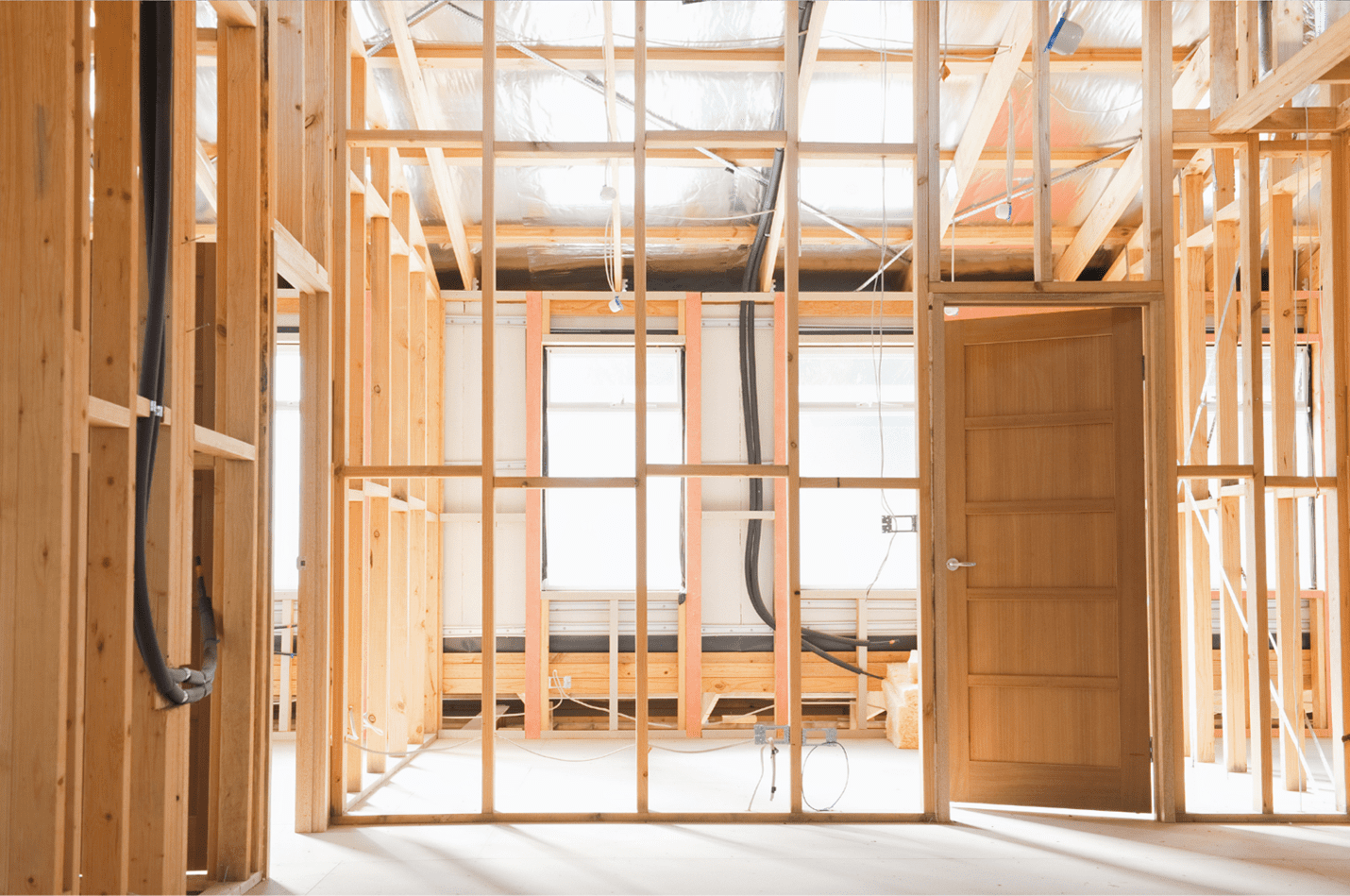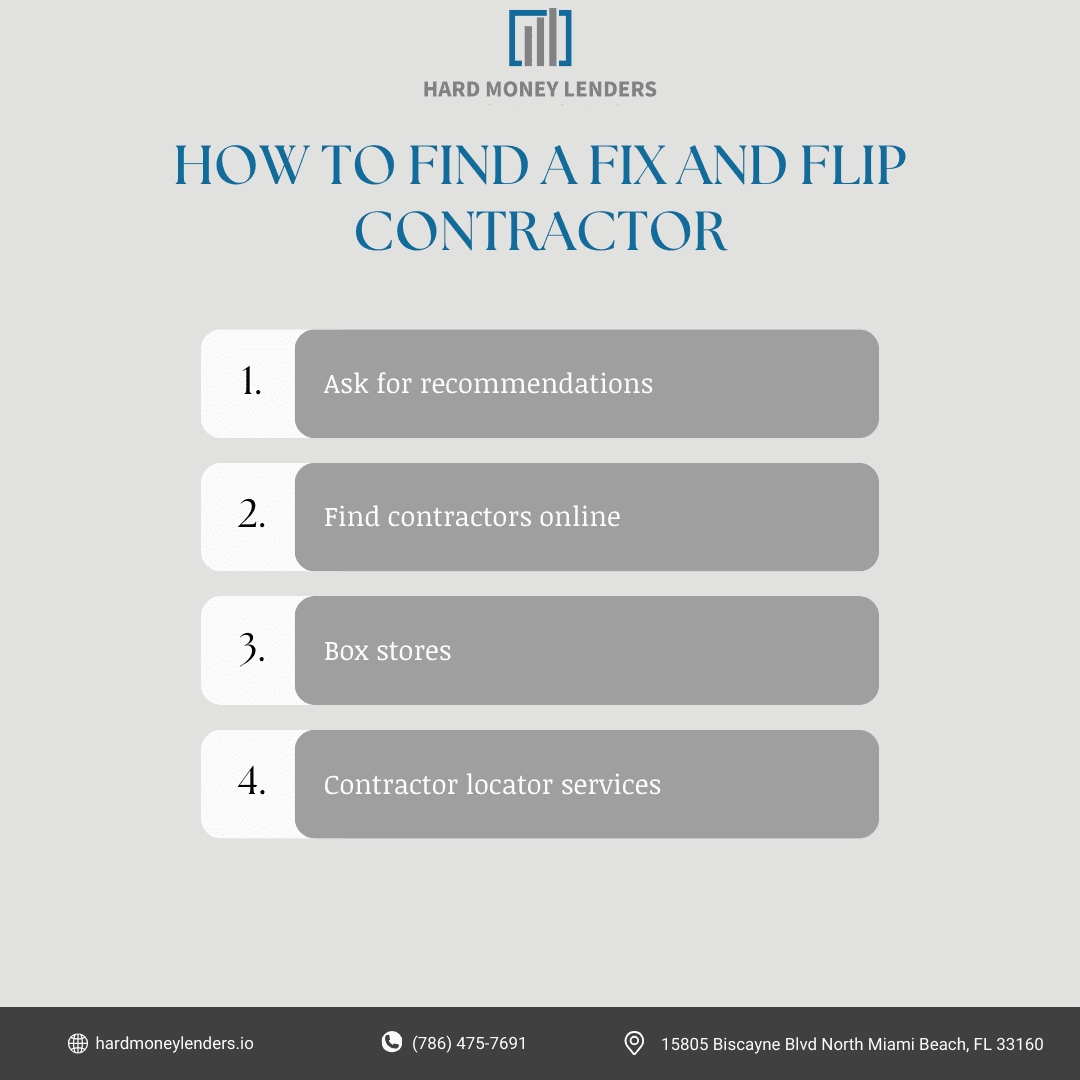Last Updated on May 27, 2024
When it comes to flipping houses, many investors focus on buying and selling properties and forget about the importance of the grunt work in between, which is renovating the house. Although this may not seem as exciting as other parts of the house flipping process, these renovations are critical to ensuring you make a profit on your fix and flip. One of the hardest parts of flipping a house is finding an excellent fix and flip contractor to work with. That said, it’s important to learn how to find a fix and flip contractor.
Now, hiring a contractor comes with many risks. Contractors can be expensive, slow to complete their work, or may not live up to their promises. Ensuring that your property is repaired correctly and in a timely manner is key to a successful flip. Therefore, you want to find a contractor who will provide detailed and accurate bids, communicate effectively, and deliver on their agreements. If you’re wondering how to find a great contractor, we’re here to help!
How to Find a Fix and Flip Contractor
 Ask for recommendations
Ask for recommendations
The first step to finding an excellent contractor is typically to ask around for recommendations. Reach out to your family members, friends, and even co-workers to see if they’ve used any great contractors before. This is one of the best ways to verify if a contractor will be good to work with, because you can get an unbiased review of their past work. You may also be surprised by how many people you know have used contractors before!
However, just because you’ve been recommended a promising contractor doesn’t mean you should automatically trust them. Regardless of who your contractor is, you should always check up on them and oversee their work throughout the renovation process to make sure they are following through on their side of the agreement.
Find contractors online
Although finding a contractor online can be risky, as they may be misrepresenting their abilities on the Internet and it can be hard to separate the good contractors from the bad ones, there are many websites that can help you in your search. Craigslist can help you find affordable options, though there will be many contractors to choose between, as posting an ad on Craigslist is completely free. You can also search for contractors on Facebook, both in the marketplace section offering their services or within real estate Facebook groups. Facebook provides a good way to get more information on contractors before hiring them, as you can usually find reviews or pictures of past work on their page. Additionally, sites like Thumbtack and HomeAdvisor are a good way to look for contractors. Angi (formerly known as Angie’s List) is another great option, mainly because contractors must pay a fee to be listed on the site, which often means the quality of options is slightly higher than on many free sites.
Box stores
You can often meet contractors on your own simply by visiting large box stores right when they open, as contractors will often get to the store first thing in the morning to buy all their supplies. Buying materials shows that they have at least one project on the go, which is a promising sign. If you know people that work at box stores, you can also ask them for recommendations, as they will likely know some local contractors that you can contact (though they’re technically not supposed to give out names).
Contractor locator services
Finally, Home Depot has contractor services available all over the country. These services are more expensive than most local contractors but can be trusted to provide a standard quality of work. There are also a few private companies that provide national or regional contracting services, though they will typically only work with you if you can offer them multiple jobs. If you are struggling to find a trustworthy contractor on your own, contractor locator services are a good way to take some of the pressure off your shoulders and get rid of the guesswork involved.
Evaluating Fix and Flip Contractors
One of the most important steps when learning how to find a fix-and-flip contractor is understanding how to evaluate and manage contractors effectively. Here’s a simple process to help you hire and work with contractors:
- Interview Process: Conduct thorough interviews to assess contractors’ experience, reliability, and fit for your specific project needs. Discuss their previous projects in detail to gauge their expertise and problem-solving abilities. Understanding their communication style and project management approach is crucial to ensuring they align with your expectations.
- Documentation Review: It’s essential to verify the contractor’s credentials thoroughly. Check their professional resume for relevant experience and past project success. Ensure they have a valid contractor’s license and sufficient insurance coverage to protect against liabilities. This step is crucial for confirming their professionalism and compliance with industry standards.
- Bid Comparison: Obtain and compare multiple bids from different contractors. This comparison helps you understand the variations in pricing and scope, allowing you to gauge who offers the best value. Analyzing different bids also provides insight into the market rates and the thoroughness of each contractor’s approach.
Financial Planning and Budget Management
When it comes to fixing and flipping a home, you’ll need to evaluate the costs of a contractor and the potential ROI.
Budgeting for Fix and Flips
Creating a detailed budget is crucial for a successful house flip. Start by itemizing all expected costs such as purchase price, closing costs, renovation expenses, holding costs, and selling expenses. Next, research the average costs in your area for each renovation task. Incorporate a contingency fund, typically 10-20% of your total budget, to handle unexpected expenses that arise during renovation, such as hidden damages or code compliance issues.
Effective budget management also involves regular reviews and adjustments. Track your spending in real-time using budgeting software or spreadsheets. Stay proactive about finding cost-saving opportunities, such as negotiating bulk purchases for materials or choosing cost-effective yet durable materials. This meticulous approach helps prevent overspending and ensures your project stays financially viable.
Evaluating Return on Investment (ROI) for Your Fix and Flip
To calculate the ROI of a fix and flip project, subtract the total costs from the final sale price of the property, then divide this net profit by the total costs, and multiply by 100 to get a percentage. For instance, if you buy a property for $150,000, spend $50,000 on renovations, and sell the property for $250,000, your net profit is $50,000. The ROI would then be ($50,000 / $200,000) * 100 = 25%.
Different renovation choices can significantly impact the resale value. Focus on improvements that appeal broadly, like kitchen remodels or adding a bathroom, which generally offer better returns. Research your target market to understand which renovations are most likely to increase property value in your specific area. Prioritize changes that enhance both the aesthetics and functionality of the property.
How do I Interview a Contractor?
Once you’ve found a potential contractor, whether through recommendations or online postings, you should interview them before making any official decisions. The first thing you want to do is get a resume of some sort, so that you have proof of their abilities and what sort of projects they have successfully completed. If you have too many options, this is a good step to narrow down potential contractors.
Next, if a contractor’s work looks promising, talk to them on the phone to get an idea of their rates, how large their crew is, and what their timeframe is for most jobs. This will help you make sure they actually know what they’re doing and can also tell you if they have the time currently to take on your job.
Finally, if the phone conversation goes well, you can meet up with them for lunch or at the office to see if you still get along with them in person. Once you have verified that they know what they’re talking about and seem like someone you can work with, meet with them at a job site and have them give you a bid for the work you need done.
It’s usually a good idea to get multiple bids, particularly if you’re new to hiring contractors, so that you don’t get ripped off. These bids will help you make your final decision, as they can give you a sense of not only the rates and timeframe needed, but also the professionalism of the contractor.
Negotiation with Fix and Flip Contractors
Negotiation Techniques
Effective negotiation with contractors requires understanding their perspectives and needs. Start by clearly outlining your project scope and expectations. Use open-ended questions to encourage contractors to explain their pricing and timelines. This helps you identify negotiation levers, such as adjusting the project scope or timeline to better fit their schedule and reduce costs.
Apply advanced techniques like the “anchoring effect” by initially proposing a slightly lower budget than you’re willing to spend. This sets a base for negotiations and often results in a final agreement closer to your target budget. Also, utilize the “mutual gain” approach by proposing solutions that benefit both parties, such as agreeing to a longer timeline for a lower price, which can lead to higher quality work and cost savings.
Building Trust and Rapport
Developing a strong relationship with your contractor is essential. Start by expressing appreciation for their skills and past work, which can foster goodwill and mutual respect. Be transparent about your expectations and budget constraints from the outset. Regularly communicate throughout the project, showing interest in their challenges and offering assistance where possible.
Trust also grows when contractors see that you respect their advice and expertise. Involve them in decision-making processes, especially when it involves their specialty. Paying on time, providing clear instructions, and being flexible with minor changes can significantly enhance trust. This foundation of respect and cooperation not only smooths the current project but can also lead to better pricing, priority scheduling, and dedicated service in future projects.
Managing Your Fix and Flip Contractors: Effective Oversight Strategies
- Regular Site Visits: Make regular visits to the construction site to monitor progress and ensure the project adheres to the planned timeline and quality standards. These visits are vital for catching issues early and keeping the project on track.
- Communication: Maintain open and consistent communication with your contractor. Regular updates and discussions about any project changes are essential for avoiding misunderstandings and ensuring that both parties remain aligned with the project goals.
- Contractual Agreements: Ensure that all agreements, including bids, timelines, and any other project details, are documented in writing. Written contracts help clarify expectations and serve as a reference for managing both parties’ responsibilities.
- Avoid Upfront Full Payments: Limit initial payments to no more than 25% of the total project cost. This approach not only motivates the contractor to maintain a high standard of work throughout the project but also protects you from financial loss if the contractor fails to meet the agreed standards.
- Material Purchases: Consider purchasing major materials yourself to control costs and ensure quality. Direct involvement in material selection can also reduce the need for large upfront payments, giving you greater control over project finances.
Final Thoughts on How to Find A Fix and Flip Contractor
Finding and hiring a good fix and flip contractor is a key part of making sure your properties are successfully renovated. Above all, the most important part of hiring a contractor is getting a written bid and overseeing their work to make sure they are meeting your standards. Make sure to always communicate with your contractors and visit the job site regularly to keep tabs on their progress.
Looking to learn more about flipping houses in Florida? Check out our guide to the best places to fix and flip a property in Florida.
 FAQs
FAQs
How do I oversee a fix and flip contractor?
No matter how great your contractor seems to be, it’s always important to oversee their work and make sure it is being completed up to your standards. Many real estate investors have horror stories about contactors letting them down and ruining their timeline on a project, sometimes even with contractors they had successfully worked with before.
The key to making sure your contractor does a good job is lots of oversight and communication. Walk through the job site with your contractor so they know exactly what you want done. Get a written bid at the beginning of a job, as well as a written estimate of when the work will be completed. This is much easier to follow up on than any verbal agreement. Stay in constant communication with your contractor and visit the job site often to see the progress for yourself. If there are any changes to the bid, the contractor should be discussing them with you. Help pick out colors and materials to stay involved with the process.
Importantly, try to avoid paying for the work up front whenever possible. You never want to pay more than 25% of the cost before the job has been completed, to motivate the contractor to do good work and keep them from slacking off or even vanishing. Sometimes you can get around paying a contractor up front by offering to purchase the materials for them, so that they don’t need a deposit. Finally, when the project is done, do a final walkthrough with the contractor so they can show you their work and you can make sure everything is completed to your standards before you pay in full.
What’s the difference between hiring a contractor as an investor versus as a homeowner?
The main difference between how real estate investors and typical homeowners work with contractors is the price that contractors charge. Most people won’t need to hire the most expensive contractor on the market to complete their job; however, homeowners often get charged more because they’re not as aware of how much projects should cost. An investor will make sure they are getting a good deal, whereas most homeowners will simply pay the price given to them by the contractor.
Although contractors can make more money working with homeowners, there are still other reasons why some would prefer to work with investors. House flipping contractors can count on a consistent flow of work from investors, particularly if they do a good job. Rather than worrying about where their next job will come from, they can stay busy with constant jobs from one source. Furthermore, it’s usually easier to work on a vacant home than one where homeowners are currently living, as they don’t need to worry about sticking to a work schedule as much.
Should I hire general contractors or subcontractors?
General contractors will do everything and take care of all the work needed on a property, whereas subcontractors will focus on one specific part of the job (such as electrical, plumbing, foundation, flooring, landscaping, etc.). Hiring subcontractors is more work for you, because you have to find and vet multiple contractors at once, but can also be cheaper and more efficient than hiring a general contractor. General contractors have so much work to do that they usually charge more and may move slower, whereas subcontractors are specialized and work fast, so you can have multiple tasks completed at once by different subcontractors.
If you are just starting out, it may be difficult to successfully find many subcontractors and create more trouble than it’s worth. For beginners, a general fix and flip contractor is a great option, whereas more accomplished investors will likely want to consider reducing their costs by hiring subcontractors once they have more experience and contacts.
Can I do the work myself to save money on a contractor?
Many beginner investors like the idea of doing the rehab work themselves to try to save money, rather than hiring a contractor to do the work for them. While this can work well if you have experience flipping and renovating houses, most investors will regret this decision. Flipping houses takes a lot of time, hard manual labor, and materials, particularly if you don’t entirely know what you’re doing. If you aren’t an efficient worker and take too long on the renovations, you may actually lose money by doing the work yourself. If you’re concerned about the price of hiring a contractor, check out our guide to fix and flip loans, which can also be used to pay for construction and renovations.

Jack Roberts has spent the last 5 years in the Private Money Lending world helping real estate investors secure financing for their non-owner occupied real estate investments. When he’s not thinking about real estate, Adam is an avid Jazz music fan and fisherman.



 Ask for recommendations
Ask for recommendations